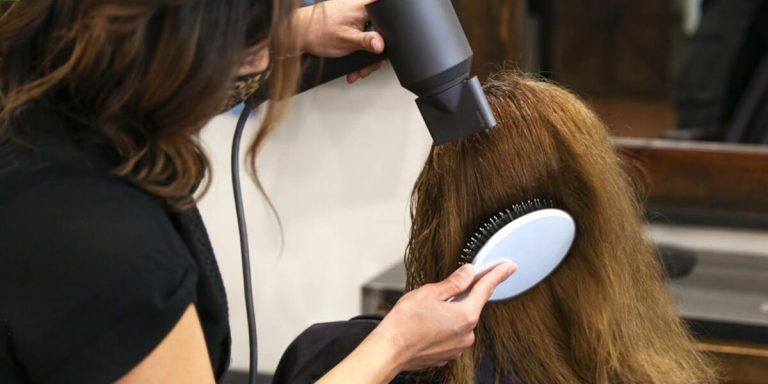Does Sjogren’s Cause Hair Loss? Unveiling the Connection between Autoimmune Conditions and Alopecia
Suffering from hair loss and wondering, “does Sjogren’s cause hair loss”? You’re not alone. Many patients with Sjogren’s syndrome have faced similar questions as they deal with the complexities of this autoimmune disease.
A condition which affects moisture-producing glands can surely prompt concerns about its potential impact on your scalp health too.
The connection between autoimmune conditions like Sjogren’s Syndrome and Alopecia is a subject that has been probed quite extensively in medical research circles. This blog post dives deep into understanding if there truly exists a relationship between these diseases or it’s just an unwarranted association built out of common symptoms.
Did you know?
Did you know that nearly 1 in every 3 people suffering from Sjogren’s syndrome, an autoimmune condition, experience hair loss? This happens due to the body attacking its own hair follicles mistaking them for foreign objects.
Understanding Sjogren’s Syndrome and Its Impact on Hair Health
Sjogren’s Syndrome is a chronic autoimmune disorder that predominantly affects the body’s moisture-producing glands, leading to common symptoms such as persistent dry eyes and mouth. However, less known is its impact on hair health – specifically, does it cause hair loss? The connection between Sjogren’s and hair thinning or balding is not straightforward but involves an understanding of how the immune system functions in this condition.
However, when affected by Sjögren’s syndrome interference occurs with these crucial processes potentially triggering undesired effects like brittle strands susceptible to breakage through reduced production of naturally hydrating oils or worse still – complete cessation of newer follicles causing visible thinning atop one’s head although symptom severity varies amongst patients reflecting unique characteristics each person’s disease progression might display.
Signs of Hair Loss Linked to Sjogren’s Syndrome
Noticing an unusual amount of hair on your comb or pillow can undoubtedly ring some alarm bells. Although it’s normal to lose 50 – 100 strands a day, excessive shedding may suggest a more serious underlying condition, such as Sjogren’s Syndrome. So does Sjogren’s cause hair loss?
Yes, indeed.
Sufferers of this autoimmune disorder often report experiencing pronounced thinning and balding due to the body mistakenly attacking its own cells – including Hair Follicles. Understanding these signs is crucial in early detection and management.
1) Excessive Shedding: The first known sign linked with Sjögren syndrome-related hair loss is extreme shedding than usual. While daily hair fall within the average range should not be alarming; however noticing clumps coming out regularly could imply something severe lurking.
Mechanisms: How Sjogren’s Contributes to Follicular Damage
Sjogren’s Syndrome is an autoimmune disease often recognized by its hallmark symptoms: dry eyes and dry mouth. However, it has far-reaching effects that can impact various aspects of your health, including hair. This might have led you to question – does Sjogren’s cause hair loss?
The answer isn’t straightforward; the syndrome doesn’t directly lead to hair loss but paves a conductive path for conditions fostering follicular damage.
To comprehend how this happens, think of our body as an interconnected machine where one malfunctioning part affects another. Similarly, in Sjögren’s syndrome – the immune system erroneously targets moisture-secreting glands causing inflammation which inadvertently pushes more hairs into their resting phase (telogen) prematurely.
Now visualize each human scalp housing over 100k tiny factories called ‘hair follicles.’ When functioning optimally these mini-factories produce robust strands at varying stages ensuring consistent coverage throughout our scalps. Hair cycles through growth (anagen), rest (telogen), and shedding phases naturally without noticeable thinning or barren patches on a healthy scalp.
Investigating Common and Uncommon Triggers of Hair Loss in Autoimmune Disorders
Hair loss, a condition that affects millions globally, has various triggers. Among these is the impact of autoimmune disorders like Sjögren’s syndrome – this fact often surprises many individuals. Though commonly associated with dry eyes and mouth due to its primary characteristic of attacking moisture-producing glands, evidence suggests that Sjogren’s can also instigate hair thinning or loss.
How does it occur? In an overzealous bid to protect the body from perceived threats, your immune system might target healthy cells in hair follicles when you have an autoimmune disorder such as sjogren’s. This unfortunate attack on your own cells can disrupt normal hair growth cycle leading to gradual thinning and potentially culminating into unexpected loss.
Such experiences underscore how crucial our understanding of uncommon triggers for alopecia becomes especially amidst rising cases around the globe. Continued research certainly sheds more light but suffice it say now; yes Sjögrens could be behind those unusual patterns in one’s crowning glory even if indirectly so through its systemic inflammation effects on the scalp among other factors we’re yet uncovering.
Correlation Between Autoimmunity and Alopecia
The term alopecia, often used interchangeably with hair loss, carries a deep-rooted connection to autoimmune disorders. To comprehend this relationship better, let’s focus on one specific condition: Sjogren’s syndrome.
Sjogren’s is an autoimmune disorder that primarily affects your eyes and mouth but can impact various parts of the body including the skin and hair follicles. Many people ask does Sjogren’s cause hair loss? The answer is yes; it can potentially contribute to alopecia in some cases.
Hair significantly impacts our appearance and self-esteem. Consequently, dermatologists worldwide pay immediate attention to unexpected or rapid balding. Recent research studies aimed at uncovering potential links between diseases like Sjögren’s Syndrome and premature balding have yielded several interesting observations:
1) Follicular Damage – Autoimmune conditions such as Sjögrens produce antibodies against healthy tissues leading them under attack by their immune system which inadvertently results in inflammation causing extensive damage to structures like sebaceous glands associated closely with maintaining good health for each strand of our crowning glory resulting thus initiating unwanted shedding.
2) Hormonal Imbalance – Autoimmune illnesses often lead to hormonal imbalances which are known contributors towards thinning tresses since they disrupt normal growth cycles.
Differentiating Symptoms: Sjogren’s-Induced Hair Loss Versus Other Conditions
In the journey of understanding ‘Hair Loss Causes, we delve into a unique subtext – Sjogren’s Syndrome. A question that baffles many is, “Does Sjogren’s cause hair loss?” To answer in simple terms: Yes.
Sjogren’s syndrome can indeed lead to excessive hair fall. The autoimmune nature of this disorder leads your body to treat your own tissues and organs as foreign objects and starts attacking them. When it targets the glands that produce moisture like salivary or tear glands as well as potentially affect other parts such as skin causing dryness which ultimately may result in conditions conducive for hair stress leading eventually towards premature thinning or shedding.
To differentiate the source of hair loss, whether it’s from an underlying condition like Sjögren’s syndrome or another cause, you may need professional assistance. Let’s learn some key differences.
Managing and Mitigating Hair Loss Caused by Sjogren’s Syndrome
The link between Sjogren’s Syndrome, an autoimmune disease, and hair loss is crucial for effective management. Individuals with this condition often report thinning or complete balding of their scalp because the disease affects the body’s moisture-producing glands. This disruption in essential oil production can cause dryness throughout the body, including the scalp.
Hair follicles require a balance of oils for healthy growth. Sjogren’s Syndrome can disturb this equilibrium and may trigger hair fall.
There are several ways we can manage and mitigate such induced hair loss despite living with an autoimmune condition like Sjogren’s Syndome in 2023 —and advances in research and technology do give us hope indeed! Hydration plays a significant role here: ensure you apply adequate moisturizers regularly to maintain good scalp health. Consuming enough water aids overall hydration levels as well improving circulation which will help stimulate slower-growing follicles.
Combat the excessive drying and potential bald patches caused by Sjogren’s syndrome effectively with personal approaches. Consume a diet rich in Omega-3 fatty acids from fish, and proteins from lean meats and eggs to promote stronger hair growth. This approach helps maintain hair volume, which this condition often reduces. Additionally, manage stress as anxiety-triggered episodes can adversely affect normal bodily responses and further increase risks.
Strategic Lifestyle Changes to Reduce Symptoms
Sjogren’s Syndrome, an autoimmune disease that primarily causes dry eyes and mouth, can unexpectedly lead to hair loss. If you’re grappling with the question – “does sjogren’s cause hair loss?”, rest assured. The answer is yes!
But worry not – your predicament has solutions.
Strategic lifestyle changes can significantly reduce symptoms associated with Sjögren’s Syndrome-induced hair loss. Consider these tips if you’re affected:
1) Hydration: Drinking plenty of water daily helps manage dryness linked to Sjögren’s Syndromes which in turn reduces inflammation on scalp potentially reducing chances of losing more hairs.
2) Balanced Diet: Consuming a diet rich in vitamins (especially Vitamin A), minerals like zinc and proteins assists strengthening your tresses from inside out.
3) Gentle Haircare Routine: Use mild shampoos and conditioners designed specifically for sensitive scalps or thinning hairs; avoiding heat styling tools prevents further stress on mane thus preserving them longer.
4) Exercise Regularly: Engaging regularly in physical activities boosts circulation including towards our precious locks promoting their growth while combating fallout caused by this syndrome.
Medical Interventions for Controlling Disease Progression
Sjogren’s Syndrome is an autoimmune disease that has been known to induce hair loss, leaving patients anxious about the progression of these symptoms. Often, individuals ask- “does Sjogren’s cause hair loss?” The answer falls into a grey area as not every patient with the syndrome experiences this side effect.
Medical interventions offer hope for controlling and managing the disease thus mitigating possible effects such as hair fall. They include medications and lifestyle changes targeted at alleviating severe dryness symptoms due to Sjögren’s – which could indirectly contribute towards reducing your chances of experiencing unwarranted hair loss as well.
Immunosuppressive drugs are frequently used in treating auto-immune disorders like Sjögren’s Syndrome. These medications aim to dampen or suppress the overactive immune response- key in preventing pain, swelling, damage to tissues & organs along with extreme dryness resulting from it – which can be factors contributing toward significant snags including potential scalp issues leading eventually into undue hair thinning or preventable balding spots on your head.
Antimalarial drugs might also play a part in remedying lupus-like illnesses inclusive of diseases mimicking similar traits like sjogrens. They manage inflammation caused by immune responses while assisting you with concerns regarding associated discomforts such as joint pains coming hand-in-hand causing difficulty sleeping even risking increased cortisol levels henceforth linked up potentially triggering unwanted subsequent alopecia (hair shedding).
Conclusion
In conclusion, while Sjogren’s is predominantly a disorder that affects your eyes and salivary glands, it indeed has been identified as an indirect culprit behind hair loss. The condition can trigger alopecia by causing dryness and inflammation on the scalp or inducing overall body stress. So ultimately when asking ‘does sjogren’s cause hair loss’, we realize this autoimmune ailment throws us yet another curveball – yes it does!
Ravaging effects like these highlight the need for awareness of various possible triggers of hair loss. To get more insights into uncommon causes linked to alopecia or any other questions surrounding “Hair Loss Causes,” you are encouraged to delve deeper into our website. It serves as a treasure trove with heaps of knowledgeable articles waiting just for you!







